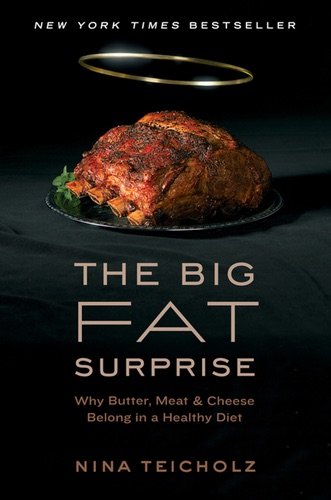- In late September, The BMJ published a critical feature article I wrote on the 2015 expert report for the Dietary Guidelines. This article was not an opinion piece but a critical examination of the science that underpins the Dietary Guidelines for America. Its main findings were:
- That the 2015 DGA expert committee (“DGAC”) did not follow the standard systematic review process at the USDA (which involves referring systematic reviews to the “Nutrition Evidence Library”) on key topics, including saturated fats and low-carbohydrate diets,
- That, as a result, the DGAC did not comprehensively review the best and most current science on these topics, and
- That the DGAC makes a number of recommendations, including those on the vegetarian diet, based on evidence that it judges to be “inconclusive.”
- The article also explains that these lapses may be due to different kinds of bias: financial conflicts of interest, outside agendas, and a desire to confirm existing advice. None of these facts are contested.
- The BMJ article was solicited by the editors of the BMJ. It was fact checked and peer reviewed, per BMJ procedures. Independently, I also submitted the article to be fact checked and reviewed by several experts, including two former members of the Dietary Guidelines Advisory Committee.
- When published, the article was criticized heavily by the 2015 Dietary Guidelines Advisory Committee and the Center for Science in the Public Interest (CSPI), a powerful DC-based activist group that has been the principal player, since the 1980s, in eliminating saturated fats from the food supply (and also lobbying for more trans fats in the 1980s, documented in The Big Fat Surprise, pp. 227-228).
- My “Rapid Response” to various criticisms was posted on October 22 by BMJ here. This response was also peer reviewed. It included a correction where, in a summary of studies on saturated fats, I did not accurately describe the results of the more authoritative of these studies. In effect, I understated the degree to which the link between saturated fat and heart disease had been challenged by review papers as of 2012, when the committee was beginning its work. I did not make a judgement about saturated fats myself but instead argued that there was enough uncertainty about saturated fat at the time to merit the committee’s requesting a formal review of the topic by the Nutrition Evidence Library, which is the standard procedure. Yet the committee did not make this request; instead, it did its own review, outside the NEL system.
CALL FOR RETRACTION
- On November 5th, CSPI publicized a letter calling for retraction of my BMJ paper based on 11 alleged inaccuracies. More than 180 experts signed this letter. These included all the members of the 2015 DGA committee, all the living authors of the Seven Countries Study by Ancel Keys, scientists involved in the American Heart Association, and others, including environmental scientists, management consultants, and graduate students. A majority of the people on this list are scientists whose work I have analyzed in a critical light in my book. According to information obtained through FOIA requests, this letter was passed around among researchers like a chain letter, and particularly promoted by Harvard epidemiologist and DGA committee member Frank Hu. When a number of signees were later interviewed by a journalist from The Guardian, he wrote, “I asked them to name just one of the supposed errors in it, not one of them was able to.”
- The US-HHS also issued a response, saying the piece was “error-laden” put did not offer any evidence for this allegation.
- On November 19th, The BMJ executive editor, Theodora Bloom, wrote that the BMJ would refer these 11 allegations to an outside review panel, per the journal’s standard procedure. She also noted that in order for the BMJ to process the CSPI letter, it needed conflict of interest (COI) statements from all the signers. She followed this up on Feb 8th, 2016, saying that the inquiry had been put to an outside review.
- On December 17, the CSPI Retraction request was officially published as a BMJ Rapid Response with the COI statements. According to independent researchers who have taken an interest in this story, eighteen signers from the original list withdrew their names from the retraction letter, leaving 173. While the motives for withdrawal might be interesting, the numbers overall are still extremely large, and lead one to question why so many names were needed for such a letter; When a pamphlet was published entitled 100 Authors Against Einstein, Einstein retorted “If I were wrong, one would be enough.” (Thanks to the nutrition scientist who sent me that!)
CONFLICTS OF INTEREST AMONG THOSE SIGNING RETRACTION LETTER
- Most of the 173 signers declared no conflicts of interest, which is contradicted by the information that I could find. Here is a spreadsheet of the signers with some of their conflicts of interest.
ALLEGED INAACCURACIES
- The 11 alleged inaccuracies cover 9 facts in the article and 2 facts in the supplementary materials. My BMJ-approved response to the 11 allegations was published here (scroll down) My complete response to these 11 allegations is here. The allegations do not, in this analysis, appear to be substantial. Two of the allegations, for example, were already addressed in my original Rapid Response. One allegation by CSPI presents no point of fact.
- To put these 11 alleged inaccuracies in context, they could be compared to the overall 700+ facts contained in the BMJ article and supplementary tables.
MEDIA COVERAGE
- There has been a substantial amount of news coverage of the BMJ piece. I put together a list here (feel free to let me know what I’ve missed).
UNCONTESTED FACTUAL INFORMATION IN THE ARTICLE
- More of the uncontested facts in the article (despite enormous scrutiny) include:
- The DGA expert committee (DGAC) did not engage in the standard USDA process (via the Nutrition Evidence Library, or NEL) for its review on saturated fat and heart disease. The DGAC’s review was done outside that process.
- In 2012, when the DGA committee started its work, there were a number of significant review papers challenging the hypothesis that saturated fats are associated with heart disease or have an effect on cardiovascular mortality. (For the complete list of review papers that have challenged the link between saturated fats and heart disease, see this.) Thus, there was enough evidence in 2012 to merit asking for a proper NEL review, but the DGAC did not do this.
- In the NEL, there is only one review (2010) on saturated fats. This review cites fewer than 12 small trials, none of which supports the hypothesis that saturated fats cause heart disease
- The many large clinical trials on saturated fats have never been directly reviewed by any of the DGA committees.
- For a number of key reviews, the DGAC relied on work done in part by the American Heart Association and the American College of Cardiology. These are private associations supported in part by industry, which pose potential conflicts of interest.
- The DGAC says despite “preliminary searches,” it could not find a body of scientific body of literature to review on low-carbohydrate diets. However, the literature included nine pilot studies, 11 case studies, 19 observational studies, and at least 74 randomised controlled trials, 32 of which lasted six months or longer.
- A NEL review of a healthy vegetarian diet concludes that the evidence for this diet’s disease fighting powers is only “limited,” which is the lowest rank for available data. Moreover, although the NEL conducted eight reviews on fruits and vegetables, none found strong (grade 1) evidence to support the assertion that these foods can provide health benefits.
- The DGA’s three recommended “Dietary Patterns” are supported by only limited evidence. The committee could find only “limited” to “not assignable” evidence to show that its diets protect against osteoporosis, congenital abnormalities, or neurological or psychological illnesses. The NEL review found only “limited” or “insufficient” evidence that the diets could combat diabetes. In a highly unorthodox move, the guideline committee overruled the NEL’s systematic reviews on this topic and decided to upgrade the rank to “moderate,” based on its opinion that one review paper on observational data, which showed positive results, was particularly strong. On the question of whether the “Dietary Patterns” can help people lose weight, the DGAC ranked the evidence as moderate, yet to support this claim, it presents only a single clinical trial in 180 people with metabolic syndrome, which found the Mediterranean diet produced more weight loss than a low fat diet. The report also gave a strong rating to the evidence that its recommended diets can fight heart disease. Again, several studies are presented, but none unambiguously supports this claim.
In conclusion, the recommended diets are supported by a miniscule quantity of rigorous evidence that only marginally supports claims that these diets can promote better health than alternatives
- The report repeatedly mentions the need to reduce “sugar and solid fats,” because, “both provide calories, but few or no nutrients. Yet this pairing is unsupported by nutrition science. Unlike sugar, saturated fats are mostly consumed as an inherent part of foods such as eggs, meat, and dairy, which together contain nearly all of the vitamins and minerals needed for good health.
- The DGA process does not require committee members to disclose conflicts of interest. The BMJ paper notes quite a few relevant potential conflicts of interest. And for the first time, the committee chair comes not from a university but from industry: Barbara Millen is president of Millennium Prevention, a company based in Westwood, MA, that sells web based platforms and mobile applications for self health monitoring.
A couple of earlier posts on the BMJ article are here.
For reporters who are writing about me or The Big Fat Surprise, please see this.



Nina, Thank you so much for your work and battling against these highly-biased nutrition “scientists.” You are greatly appreciated by many of us in the healthcare profession who have discovered the extreme bias and errors in conventional nutritional guidelines. – Tim Noonan, MD